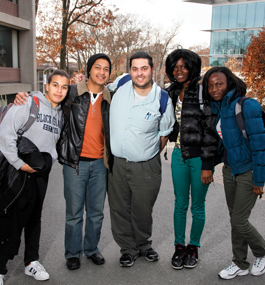An ELLIS Island of Hope

Mike Lovett
Jeremy Heyman '08 (center)
When the final bell rings at the English Language Learners and International Support (ELLIS) Preparatory Academy in the Bronx, Jeremy Heyman’s day is far from over. He has students to counsel, grants to write and a PhD to complete.
Heyman ’08, MS’08, is pursuing a doctorate in science education from Columbia University’s Teachers College while working full time as the college counselor and science outreach coordinator at ELLIS. But the hard work and long hours pay off when Heyman’s students get into college — an achievement many of them had once thought impossible.
ELLIS Academy serves newly arrived immigrants between the ages of 16 and 21. They come from around the world with little money and even less English. Many have only a few years of formal education, if any.
“They have the most challenges of any students you’ll see in this country,” Heyman says. “So, when you see the impact you can have on them, that’s when this job gets really fun.”
Heyman joined ELLIS as a chemistry teacher. The school had such limited resources that his lab had no running water. He taught in English and Spanish. Many of his students worked part-time jobs, so he held tutoring sessions in Burger Kings and Targets. The more time he spent with the students, the more in awe of them he became.
For instance, there was Sanusi, who came to ELLIS from war-torn Sierra Leone. He grew up with little electricity; his parents could neither read nor write. After arriving in the Bronx, he was tempted by the easy money of gang life. Instead, he chose Heyman’s classroom. Though he worked nights as a security guard, he rarely missed a day of school. Now he’s pursuing a degree in pharmaceutical sciences at the University of Buffalo. His photo hangs in Heyman’s office.
“These students are my heroes,” says Heyman.
Today, Heyman organizes discussions about research and careers in science, technology, engineering and math. He and his students have published a science journal and developed science-themed hip-hop for the Science Genius competition in New York City.
“When you can reach a student, it is so rewarding,” Heyman says.
He remembers the feeling when two of his students got Brandeis acceptance letters, how they celebrated and cried.
“I stay for moments like that,” he says.
— Leah Burrows
